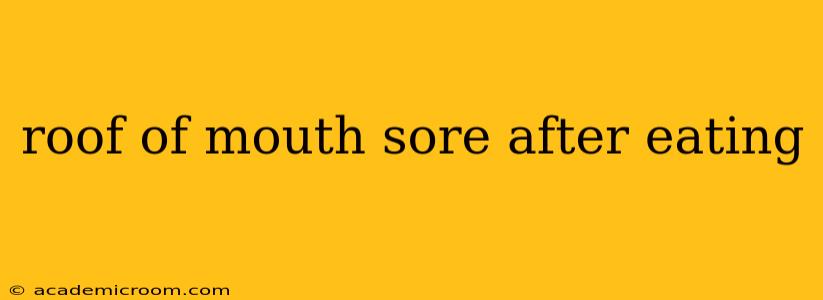A sore roof of the mouth after eating is a common and often uncomfortable experience. While usually temporary and easily treated, understanding the underlying causes can help prevent future occurrences and ensure prompt relief. This comprehensive guide explores the various reasons why your mouth might be hurting after meals, offers effective remedies, and provides preventative measures.
What Causes a Sore Roof of the Mouth After Eating?
Several factors can contribute to a sore roof of the mouth after eating. These range from minor irritations to more serious underlying conditions. Let's explore some of the most common culprits:
1. Accidental Burns:
This is perhaps the most straightforward cause. Hot food or drinks, especially if consumed too quickly, can easily burn the delicate tissues of the palate. The pain can range from mild discomfort to significant burning and even blistering.
2. Irritation from Sharp Foods:
Certain foods, particularly those with sharp edges or rough textures, can scratch or irritate the roof of your mouth. Think about things like chips, crackers, or even uncooked vegetables. These abrasions can cause pain and inflammation.
3. Acid Reflux (GERD):
Stomach acid refluxing back into the esophagus can reach the mouth, leading to irritation and soreness. This can manifest as a burning sensation on the roof of the mouth, especially after consuming acidic foods or lying down shortly after eating.
4. Food Allergies or Sensitivities:
Certain food allergens or sensitivities can trigger an inflammatory response in the mouth. This can lead to swelling, redness, and a painful, sore roof of the mouth.
5. Oral Thrush (Candidiasis):
This fungal infection can cause a white, creamy coating on the tongue and the roof of the mouth, accompanied by pain and soreness. It's more common in individuals with weakened immune systems or those taking antibiotics.
6. Dry Mouth (Xerostomia):
A lack of saliva can increase the risk of mouth sores and irritation. Without adequate saliva to lubricate and protect the tissues, even mild abrasions can become painful. This can be exacerbated by certain medications.
How to Treat a Sore Roof of Mouth After Eating?
Treatment depends on the underlying cause. However, several remedies can provide relief from the discomfort:
1. Over-the-Counter Pain Relief:
Non-prescription pain relievers like ibuprofen or acetaminophen can help manage pain and inflammation. Always follow the dosage instructions on the label.
2. Saltwater Rinse:
Gargling with warm saltwater (1/4 teaspoon salt in 8 ounces of warm water) can help clean the area, reduce inflammation, and soothe the pain.
3. Cold Compress:
Applying a cold compress to the affected area can help numb the pain and reduce swelling.
4. Soft Foods:
Sticking to soft, easily chewed foods until the soreness subsides can help prevent further irritation. Avoid crunchy, acidic, or spicy foods.
5. Honey:
Applying a small amount of honey directly to the sore area can provide soothing relief and promote healing. Honey has natural antibacterial and anti-inflammatory properties.
When to See a Doctor?
While most cases of a sore roof of the mouth after eating resolve on their own, it's essential to consult a doctor or dentist if:
- The pain is severe or persistent.
- You develop a fever or other systemic symptoms.
- The sore doesn't heal within a week or two.
- You notice white patches or unusual lesions on the roof of your mouth.
These symptoms could indicate a more serious underlying condition requiring professional medical attention.
Preventing a Sore Roof of Mouth After Eating
Prevention is often the best approach. Here's how to reduce your chances of experiencing a sore roof of your mouth after meals:
- Cool down hot foods and drinks: Before consuming them, allow hot foods and beverages to cool down to a safe temperature.
- Eat slowly and chew thoroughly: This helps prevent accidental burns and minimizes the risk of irritation from sharp food particles.
- Stay hydrated: Proper hydration helps maintain adequate saliva production, keeping your mouth moist and reducing irritation.
- Maintain good oral hygiene: Brushing and flossing regularly can help prevent infections and maintain the health of your oral tissues.
- Identify and avoid trigger foods: If you suspect a food allergy or sensitivity is causing the problem, keep a food diary and work with your doctor or allergist to identify and eliminate those foods from your diet.
By understanding the causes of a sore roof of the mouth after eating, implementing appropriate remedies, and employing preventive measures, you can keep your mouth healthy and comfortable. Remember that if the pain is severe, persistent, or accompanied by other concerning symptoms, seeking professional medical advice is crucial.
